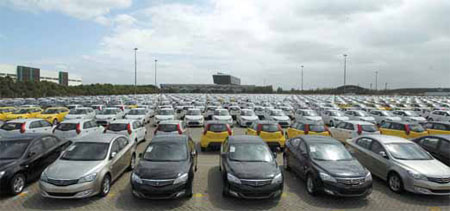Starting line for Shanghai free trade zone
Widely seen as a test ground for deeper and wider financial reforms, an ambitious pilot free trade zone has been unveiled by the Shanghai city government, but the auto industry has mixed views on the possible impact.
"The most likely influence on the auto industry will be to boost exports," industry analyst Zhang Zhiyong told the Guangzhou-based Southern Metropolis Daily.
As more export-friendly measures are implemented in the 29-square-kilometer zone, Zhang expects auto companies will benefit from better efficiency at customs and offer even more competitive prices in overseas markets.
Gu Feng, CFO of SAIC Motor Corp, China's biggest automaker by sales, said the benefits could have a deeper impact.
"The zone can help cut operating costs and offer a better investment and financing channel," Gu told China Business News.
A wholly owned international commerce and trade subsidiary of Shanghai-headquartered SAIC is among the first 25 companies allowed to register in the zone. Industry insiders estimate that the subsidiary can help cut SAIC's export costs by 20 percent due to the zone's preferential policies.
Gu said that his company has worked out a three-step plan, with the first step transferring its import and export operations to the zone.
It also plans to establish a facility in the zone to process and export completely knocked-down kits and establish an overseas investment center if the zone offers favorable financial policies.
"Our business in the zone will grow rapidly. The sales will exceed 20 billion yuan ($3.28 billion) in five years and reach 100 billion yuan in 2030," Gu predicted.
But some experts say there are strings attached.
"It will boost auto exports to some extent but that is conditional," said Cui Dongshu, deputy secretary-general of China Passenger Car Association, in an interview with China Times.
Cui said a prerequisite is bilateral trade pacts that offer favorable tax rates to both sides, adding that it will take time for the Shanghai government to reach such agreements with foreign countries or regions.
Industry analysts also hold different views as to whether the zone will also help cut the prices of imported vehicles.
Lin Huaibin, an analyst at consulting firm IHS, told China Daily that it is unlikely that imported vehicles will enjoy a zero tariff or see sharp price falls because that would have a negative effect on local auto brands.
But Zhao Wei, head of the Institute of International Economics at Zhejiang University, said imported vehicle buyers could benefit greatly.
"Just like the effects of the free port of Hong Kong on vehicle prices in Guangdong, imported vehicles will get cheaper.
"It is possible for prices to fall by 20 percent or one-third," Zhao told China Times.
But he said it will take two to three years before the true effect of the zone to be felt.
In contrast to the enthusiasm at SAIC, some other auto companies are more cautious about the possible benefits of the free trade zone.
Also headquartered in Shanghai, Volvo Group China has a wait-and-see attitude.
"The key word about the free trade zone is 'pilot'. In other words, the results of new policies are yet to be seen.
"So we are evaluating when and how to move into the zone," Shen Hui, head of Volvo Group China, told the media.
Porsche is the first international brand to have a showroom in the zone, but the China Times cited a Porsche China executive saying that the showroom "has nothing to do with the establishment of the free trade zone".
"We signed the letter of intent to open the shop back in September last year and this one is no different than our other stores," said the executive.
lifusheng@chinadaily.com.cn
|
Cars made by SAIC Motor Corp await shipment at the Yangshan Free Trade Port in Shanghai. Some other automakers are taking a wait-and-see approach until benefits are clear. Ding Ting / Xinhua |



















